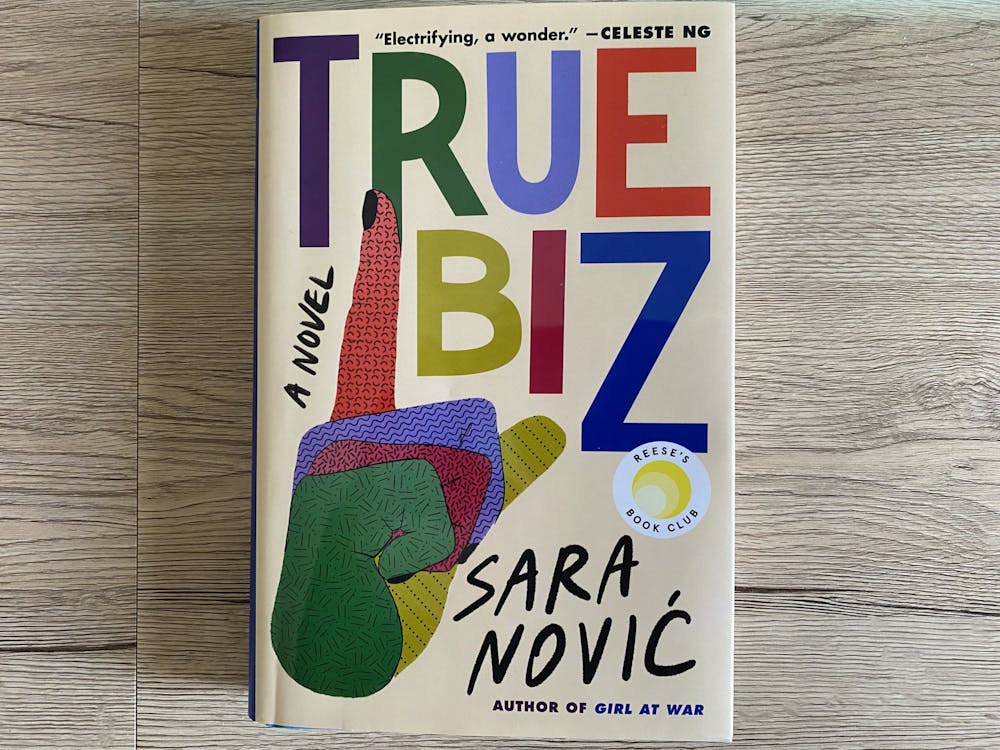I was late to my Tuesday evening class because I couldn’t put down this week’s book. This sounds hyperbolic, but my notes — missing coverage from the first 15 minutes of class — will attest to its truthfulness.
True biz, characters from author Sara Nović’s latest novel might sign after giving such an introduction.
“True biz” — the exclamation from which the book draws its title — means “really, seriously, definitely, real-talk,” according to the book. It’s a frequently used sign in River Valley School for the Deaf, where Nović sets her April masterpiece.
In it, readers jump perspectives primarily between Charlie, Austin and February. Each character’s chapter is designated with an icon of the letter “c,” “a” or “f” in American Sign Language’s fingerspelling. Charlie is a transfer student raised without access to sign language, Austin is the resident cool kid who comes from a legacy Deaf family, and February is their headmistress.
Nović, an instructor of Deaf studies and creative writing, lends authenticity and grace to the story. Readers are immersed in a coming-of-age tale that envelops communities of all kinds, illuminating universal and group-specific experiences.
River Valley is equally relatable and insightful, littered with experiences all high schoolers have had and those particular to members of the Deaf community.
Kayla, Charlie’s roommate at River Valley, uses TikTok to teach her followers about Black ASL, a dialect of ASL whose diverging signs sometimes garner her casually racist remarks. Austin experiences personal conflict when his sister is born hearing, joining a generations-deep Deaf family.
Nović straddles hot topics with unreal grace — navigating conversations about cochlear implants, radical politics, parental overstep and high school relationships with ease.
Introductions to Deaf culture are plugged into the novel, comprising pages sharing ASL grammar and history with readers. As a former student of IU’s reputable ASL program, I had been exposed to some of the background thanks to my professors, but readers ranging from Charlie’s novice level of study to Austin’s native level would find it equally as accessible.
Some of the culture insertions were previously included in my classes, but some were entirely new to me. A casual mention of the Clash playing at a Deaf club on one page taught me that punk rock bands used to rent out Deaf clubs as concert venues.
I was entirely dialed into Nović’s story to the extent that I left the pages only to Google more information after learning tidbits like this, yet I couldn’t even bring myself to close the book to arrive at a lecture on time.
Nine out of ten Deaf children are born to hearing parents, so it’s always been mind-boggling to me that ASL is not taught to all students, everywhere. Nović alone cannot fix this gross social oversight, but her story embodies representation for a community living in an ableist world.
“True Biz” stands out for its beautiful language, its compelling story and its social commentary all at once.
I dog-eared pages for Nović’s abilities in a multitude of categories. She neither minces words nor accepts mediocre ones.
“Fall in Colson was a wild, capricious thing—the weather shifted from muggy to cool without notice, and squalls often pushed in from the river,” she writes, transforming a setting provided in mere ink to one with vivid details I could picture when I closed my eyes.
Chapters later, she reflects on what “the world might be like if deaf people had as short a fuse about hearing people’s inability to sign, their neglect or refusal to caption TV, or, hell, the announcements on this bus” as hearing people have toward their Deaf counterparts’ lack of response to verbal exchanges.
This book makes my lifelong list of favorites. I’m already awaiting Nović’s next work and am thankful it will come after my graduation, or “True Biz” wouldn’t be the last time I read through class.




